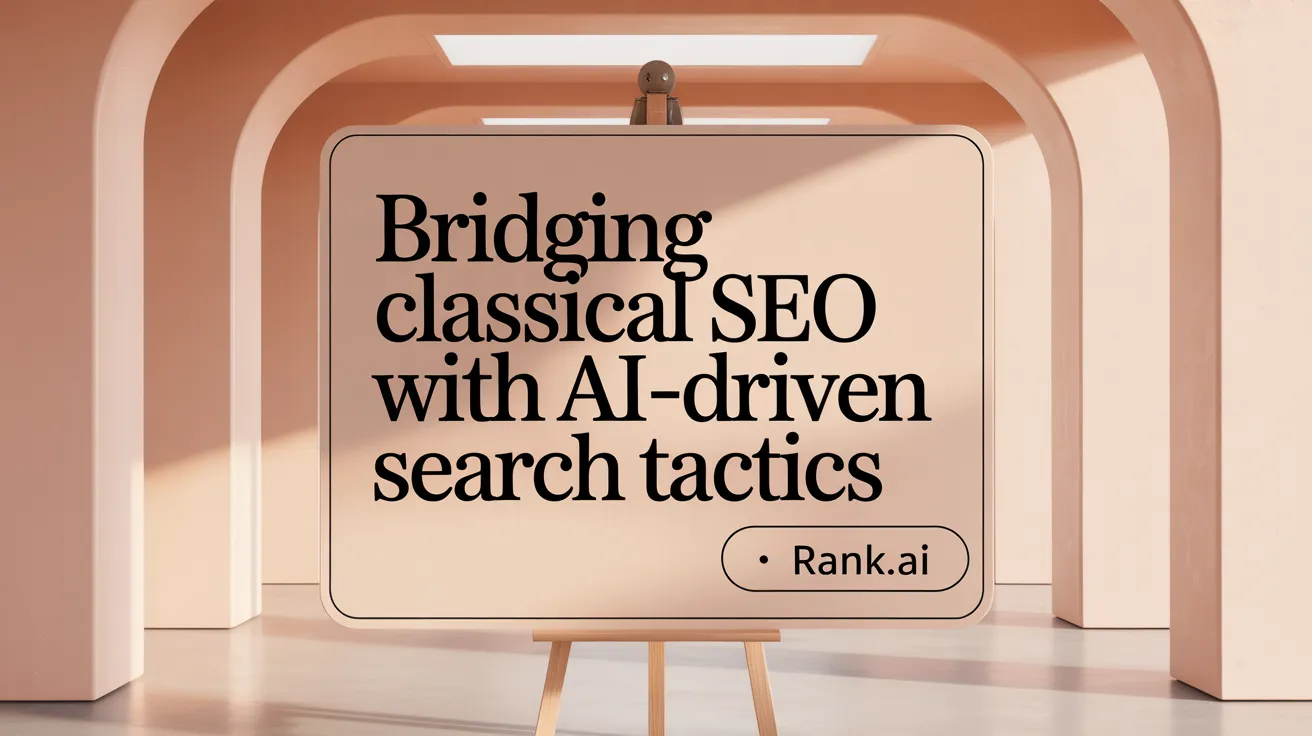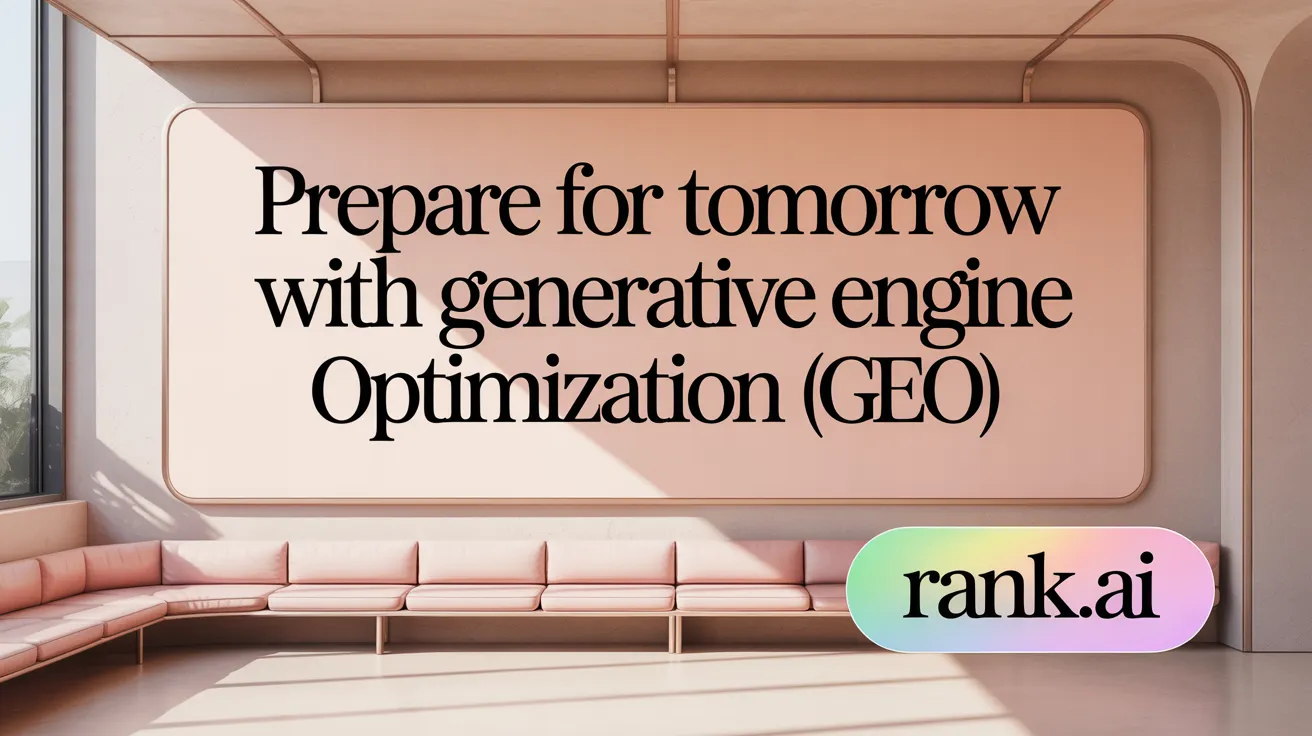Optimizing for Google’s AI Search Systems: Strategies You Need to Know
Mastering Visibility in Google's AI-Driven Search Landscape

Navigating the New Era of Search
With the rapid evolution of Google's AI search systems such as AI Overviews and AI Mode, optimizing for AI-powered search results demands a fresh approach that blends traditional SEO principles with generative engine strategies. This article explores essential tactics for appearing prominently in AI-generated summaries, maximizing user engagement, and adapting to the future of search.
Understanding Google's AI Search Ecosystem
How does Google's AI influence search results?
Google's AI innovations, including AI Overviews and AI Mode, reshape search results by summarizing information from multiple trusted sources into concise answers. These AI-generated responses appear prominently above traditional organic listings, delivering instant context-aware information that reduces the need for users to click through to individual websites.
Overview of Google’s AI search features like AI Overviews, AI Mode, and Search Generative Experience (SGE)
- AI Overviews provide interactive, summarized answers sourced from diverse web pages and are widely available globally.
- AI Mode uses the Gemini language model to generate deep, conversational responses with multimodal capabilities, such as processing voice and image queries.
- Search Generative Experience (SGE) pioneered generative AI integration in search, forming the basis for AI Overviews and AI Mode enhancements.
Impact of AI on traditional organic search results and click-through rates
AI-generated summaries considerably reduce click-through rates by about one-third, as users find their answers directly within search itself. While this decreases traditional website traffic, engagement quality improves when clicks occur, as AI-driven visits tend to be more targeted and valuable. See AI search optimization insights for strategies to address these changes.
Evolution of search from keyword to conversational and multimodal queries
Modern search now emphasizes natural, conversational questions rather than simple keywords. Users employ voice commands, images, and video inputs, encouraging search engines to understand deeper intent. Consequently, SEO strategies must adapt, focusing on comprehensive, well-structured content optimized for AI comprehension and multimodal accessibility. Learn more about adapting SEO for AI-driven search and optimizing multimedia content.
Together, these shifts represent a transformation in how users engage with search, highlighting the importance of aligning digital content strategies with AI-powered search features for enhanced visibility and user satisfaction.
Core Principles of Optimizing for AI Search

Creating unique, valuable, and user-focused content
AI search optimization starts with crafting content that is both unique valuable content and valuable, directly meeting users' needs. AI queries tend to be longer and more specific, and therefore content should comprehensively address those questions with clear, authoritative answers. This focus increases the chance that AI systems like Google's AI Overviews will cite and rank your pages.
Maintaining high-quality page experience including mobile responsiveness and fast loading times
A superior good page experience across all devices is crucial. Fast page loading times and mobile responsiveness ensure visitors stay engaged and interact with your content, which AI search algorithms value highly. Easy navigation and device accessibility further enhance the overall page experience, supporting better indexing and user satisfaction.
Ensuring technical SEO compliance for AI crawlers
Technical factors are fundamental to AI search visibility. Your site must allow AI crawlers like Googlebot avoiding blocking Googlebot, maintain proper HTTP status codes, and ensure ensuring indexable content. Properly configured robots.txt files, sitemaps, and clean URLs help in smooth crawling while preventing accidental blocking. Staying compliant with these technical requirements for Google Search ensures your content can be discovered and evaluated by AI systems.
Using structured data aligned with visible content to enable rich results
Structured data plays a pivotal role in AI search optimization. Employing schema markup such as FAQPage, HowTo, and QAPage that mirrors exactly the visible content enables AI models to better understand and extract information. This alignment facilitates qualifying for rich results, increased chances of featured snippets, and improved AI summarization.
What are key content requirements for AI search optimization?
Content must be uniquely valuable content and directly meet users' needs, especially for AI queries that are longer and more specific. A great page experience with responsive design, fast load speeds, and accessible content that’s properly crawled and indexed is essential. Structured data, such as schema markup (FAQPage, HowTo, QAPage), should accurately reflect visible content to help AI systems provide rich, informative responses.
Integrating Traditional SEO With AI-Powered Search Strategies

How do traditional SEO and AI search optimization overlap?
There is a significant overlap between traditional SEO and AI search optimization principles. Both prioritize creating clear, helpful, and authoritative content that satisfies user intent. While AI-powered search models—like Google’s AI Overviews and ChatGPT—use sophisticated understanding and real-time data to generate responses, the foundation remains rooted in classic SEO practices: good site structure, relevant keywords, and quality backlinks. For detailed insights on this overlap, see SEO and AI search optimization overlap.
Why are content clarity, authority, and helpfulness so important in AI contexts?
AI systems assess reputation, expertise, and context when selecting content to cite or feature. Clear writing, comprehensive coverage, and demonstrable expertise (E-E-A-T (Experience, Expertise, Authority, Trustworthiness)) increase the likelihood of AI citing your content in its answers. Helpful and trustworthy content stands out as it matches the more complex, conversational queries typical of AI search. Learn more about the importance of creating unique valuable content fulfilling users' needs and how E-E-A-T impacts AI SEO.
How can SEO tools like Google Trends, Ads, and Search Console be used alongside AI insights?
Using traditional SEO tools remains vital. Google Trends helps identify evolving user questions, Ads data informs intent and keywords, and Search Console reveals how your pages perform and where AI-driven traffic may be coming from. These tools—when combined with AI search behavior insights—guide effective content optimization strategies that meet new AI-driven search demands. Explore how to leverage Google Trends and Ads for AI search optimization and optimize your content with Search Console insights.
What is the shift from ranking to being recommended in AI responses?
Unlike traditional SEO focused on ranking high in search engine result pages (SERPs), AI SEO now emphasizes being recommended or cited by AI systems. Ranking is still relevant but secondary to AI recognizing your site as a trusted source to answer user queries. Strategies include structured data use, maintaining topical authority, and fostering brand reputation, which promote inclusion in AI-generated responses. Learn more about optimizing for AI-driven recommendations and building authority for AI search.
How does Rank.ai integrate AI technology with traditional SEO methods?
Rank.ai blends AI-driven insights with traditional SEO tactics by automating keyword research, content creation, and detailed analysis. It emphasizes content relevance, structured data, and technical SEO optimization aligned with Google’s evolving AI models such as Search Generative Experience (SGE) and Google AI Mode. This integration ensures websites are recognized within AI Overviews and generative AI answers rather than solely relying on organic rankings, thus maximizing visibility in the AI search ecosystem. For further reading, see Google AI Mode SEO strategies and technical SEO best practices for AI.
Leveraging Structured Data to Enhance AI Comprehension and Visibility

What is Schema Markup and Why is it Important?
Schema markup, especially in JSON-LD format, is a standardized way to annotate web content so that AI search engines and other digital systems can better understand its context and structure. It serves as a precise language that labels content such as FAQs, How-Tos, products, and events, enabling AI systems like Google AI Overviews, ChatGPT, and Perplexity to identify and process relevant information efficiently.
Using Schema Markup to Annotate Key Content Types
Common schema types that enhance AI search visibility include FAQPage for frequently asked questions, HowTo for instructional content, and Product for e-commerce items. By marking these content types accurately, websites increase their chances of appearing in rich search results, featured snippets, and AI-generated answers, which drives higher-quality engagement. See more about Schema Markup for AI Search.
Importance of Alignment with Visible Page Content
Structured data must precisely reflect the actual content users see on the webpage. Discrepancies between markup and visible text can undermine search engine trust and prevent rich result features. Maintaining this alignment ensures that AI systems can confidently cite your content as authoritative and trustworthy in their responses. This is crucial for accurate structured data and building authority for AI trust.
Technical Validation and Continuous Monitoring
Implementing schema markup correctly requires validation using tools like Google’s Rich Results Test and Search Console. These validate syntax and flag errors that could hamper AI comprehension. Ongoing monitoring helps detect schema issues early, ensuring that your rich results and AI citation eligibility remain optimized over time. For technical best practices, see Technical SEO for AI Ranking.
Leveraging well-structured, accurate schema markup is a fundamental step in enhancing content visibility in today’s AI-powered search landscape. It supports comprehensive understanding by AI engines and significantly improves the chances of being featured in AI summaries and rich snippets, as covered in Optimizing for AI Search.
Supporting Multimodal Search Success with Rich Media
Why Are High-Quality Images and Videos Important?
Visual elements like images and videos enrich your content, making it more engaging and informative. In AI-driven search environments, these media types support multimodal search success where users expect to see not just text but visual responses as well. High-quality visuals improve user experience by providing clearer explanations and attracting longer visitor engagement (Google content performance tips).
How Can You Optimize Images for AI Search?
Optimizing images for AI involves using descriptive alt text and proper filenames. Alt text should clearly describe the image content using relevant keywords, helping AI systems understand and index visuals appropriately. Filenames should be concise and keyword rich to further support discoverability. Additionally, fast-loading, well-compressed images ensure smooth performance across devices, aiding AI evaluation (optimizing images for AI search, Google AI Overviews.
How Does Rich Media Enhance AI's Visual Interpretation?
AI algorithms leverage high-quality images and videos to better interpret and answer user queries that include visual components. Detailed visuals backed by proper metadata enable AI to deliver richer, more accurate search results and featured visual snippets, increasing your content's chances of being cited or recommended (supporting multimodal search success, visual video multimodal content).
What Is the Role of Merchant Center and Business Profiles?
For commerce-related searches, keeping your Merchant Center data and Business Profiles up-to-date is crucial. These platforms provide product images and business details that AI integrates into search results and recommendations. Optimizing these assets ensures your brand and products appear in relevant AI-driven shopping and local search responses, boosting visibility and user trust (up-to-date Merchant Center info, up-to-date Business Profile info).
Monitoring and Measuring AI Search Performance
Emerging AI-Centric Metrics
With the rise of AI-powered search features like Google AI Overviews, traditional metrics such as clicks and rankings are no longer sufficient. New performance indicators include AI visibility—how often your content is cited or referenced by AI responses—citation frequency, and snippet performance. These metrics offer deeper insight into how your content is influencing AI-generated answers and driving meaningful traffic.
Specialized AI Tracking Tools
To effectively monitor AI search presence, marketers are turning to tools like Surfer’s AI Tracker and SEMrush’s AI Rankings report. These platforms track brand mentions, citations in AI content, and position in AI-generated summaries, helping businesses understand their footprint within AI search results beyond conventional SEO analytics.
From Clicks to Engagement and Conversion
AI search visitors tend to engage more deeply and convert at higher rates than traditional organic visitors. Therefore, the focus shifts from merely increasing click volume to optimizing for visit value, including metrics like user engagement, conversion rates, session duration, and customer lifetime value, which better reflect AI-driven search success.
Continuous Content Audits and Updates
Given the rapid evolution of AI search algorithms and user behavior, regular auditing and updating of content is essential. Refreshing data, adding authoritative examples, improving clarity, and restructuring content to answer emerging questions help maintain relevance and enhance AI visibility over time as detailed in How to Rank in AI Search Results.
In summary, monitoring AI search performance demands a new approach with specialized metrics and tools. Successful optimization includes tracking AI-specific indicators, prioritizing quality engagement over quantity, and maintaining dynamic, authoritative content to meet the evolving AI-driven search landscape (source).
Adapting Content for Conversational and Complex AI Queries

How should content be structured for conversational AI search?
To meet the needs of conversational and complex AI queries, content should be organized with clear, descriptive headings and subheadings. Using formatted elements like bullet points, numbered lists, and tables helps break down information into digestible, easy-to-scan segments that AI models can parse effectively. This modular structure allows AI systems to extract precise answers from specific content blocks, improving the likelihood of being featured in AI-generated responses.
What role do long-tail and question-based keywords play?
Long-tail and question-based keywords are essential for optimizing content for AI search. Since AI queries are often more conversational and specific, incorporating these detailed keyword phrases aligns your content more closely with user intent. This approach increases the chances that AI engines will select your content to answer nuanced questions, especially in areas involving how-tos, decisions, and advice (source).
Why plan for follow-up questions and deeper topic clusters?
AI algorithms consider not only the initial query but also potential follow-up questions users might ask. Creating topic clusters with interconnected pages and related subtopics builds a comprehensive resource that satisfies both the primary question and its deeper layers. This strategy strengthens your site's topical authority, encouraging AI engines to recognize your content as reliable and authoritative and authoritative.
How can language style improve AI content differentiation?
Using natural, engaging, and conversational language distinguishes your content from robotic or generic AI-generated text. Adding personality, clear insights, and expert tone makes content more appealing to users and helps AI systems perceive it as human-authored and credible. This authentic voice enhances user trust and increases the chance that your answers are cited in AI search results (learn more).
Building Authority and Trust to Influence AI Recommendations
Earning backlinks and online mentions from reputable sources
Backlinks and mentions from well-known and credible websites serve as strong endorsements of your content's reliability. AI search engines consider these signals as indicators of authority, influencing whether your content is cited in AI-generated responses. Engaging in digital PR, contributing guest posts, and actively participating in industry forums and Q&A platforms can help you gain these valuable backlinks and mentions. For more strategies, see AI Search Optimization and 4 Strategies to Boost Your Brand's AI Search Visibility.
Securing placements in authoritative lists and directories
Being listed in high-authority comparison lists and databases significantly boosts your visibility in AI search recommendations. Lists curated by reputable platforms or directories like Britannica or McKinsey act as trusted sources for AI algorithms, increasing your chances of being featured in AI-generated answers. Proactively submitting your brand or content to such lists enhances your content’s credibility and reach. Learn more from AI Search Optimization Strategy and Best Practices and Generative Engine Optimization (GEO).
Leveraging awards, social sentiment, and accreditations
Recognition through awards and accreditations strengthens your reputation, contributing positively to AI's evaluation of your content’s trustworthiness. Additionally, positive social sentiment and online reviews are increasingly factored into AI search algorithms. Maintaining a strong, positive online presence through excellent customer interactions and reputation management is vital. See insights on Impact of Online Reviews and Social Sentiment on AI Engines and AI-Powered Search Marketing.
Integrating expert credentials and original data for E-E-A-T (Experience, Expertise, Authority, Trustworthiness)
Demonstrating [E-E-A-T (Experience, Expertise, Authority, Trustworthiness)] by including expert authorship, citing original research, statistics, and case studies reinforces your content’s credibility. AI systems favor content that clearly showcases authority and provides verifiable, data-driven insights. Structured content highlighting expert credentials helps both AI algorithms and users recognize your content’s reliability. For deeper details, refer to Succeeding in AI Search with E-E-A-T and Google AI Overviews SEO.
Building authority and trust requires a multi-faceted approach that combines technical SEO with strategic content and reputation management, ensuring your brand is favored in evolving AI search ecosystems. For comprehensive guidance, explore How to Rank in AI Search Results and SEO in the Age of AI Search Engines.
Rank.ai: AI-Driven SEO and Digital Marketing Solutions
What is Rank.ai and what services does it offer?
Rank.ai is a powerful AI-driven platform focused on boosting search engine optimization (SEO) and digital marketing for a wide range of businesses. It provides automated content creation to generate unique, valuable web content that meets user needs. The platform also conducts detailed keyword analysis and website auditing, ensuring your site meets technical standards for crawling and indexing by search engines. Beyond the technology, Rank.ai functions as a digital marketing agency offering expert SEO consulting to refine marketing strategies and campaigns, simplifying the path to higher search rankings.
Which search engines does Rank.ai support for SEO optimization?
Rank.ai supports a broad spectrum of search engines including Google—the dominant player—as well as emerging AI-powered search platforms that are reshaping how search results are generated. It integrates with key industry tools such as Semrush, Search Atlas, and Yext, enhancing coverage for both traditional SEO rankings and AI-driven search results. This comprehensive approach ensures visibility across evolving search environments, including AI Overviews and generative AI responses.
What types of businesses can benefit from Rank.ai's services?
Businesses across all sizes and industries can leverage Rank.ai’s AI-enhanced SEO and digital marketing capabilities. Its solutions are designed to meet the needs of small and medium-sized enterprises (SMEs) seeking growth, as well as large corporations aiming to optimize extensive digital portfolios. Industries such as healthcare, finance, retail, automotive, and logistics have seen significant efficiency gains and expanded online presence through AI-powered marketing, making Rank.ai’s tools and agency services broadly applicable.
Rank.ai delivers a fusion of AI technology and traditional SEO expertise, helping companies adapt to the fast-evolving landscape of search engines. From creating machine-readable, expert content to managing technical SEO and optimizing for both human and AI search interpretations, Rank.ai positions businesses for success in a competitive digital world.
Automated Content Creation and Its Role in AI SEO Performance
How does automated content creation by Rank.ai impact SEO performance?
Automated content creation, such as that powered by Rank.ai, plays a significant role in enhancing SEO performance by rapidly producing optimized content tailored to user intent. This swift generation of relevant material helps boost search rankings and increase organic traffic. However, AI content is most effective when combined with human oversight to ensure authenticity and maintain quality standards.
How AI-generated content aligns with SEO goals
AI-generated content can directly align with SEO objectives by addressing long-tail keywords, emerging search trends, and creating niche or comprehensive coverage that fills existing content gaps. This method leverages AI's ability to analyze user queries and produce clear, structured, and authoritative content, which is highly favored by modern AI search engines.
Enhancing quality through human oversight and keyword optimization
While AI helps with volume and speed, human editors improve AI content by refining readability, adding expert insights, and optimizing keyword placement to best match evolving search behaviors. This collaboration helps comply with Google's emphasis on unique, valuable, and helpful content, ensuring content is not only optimized for ranking but also for user experience.
Filling content gaps and targeting emerging search trends
Automated tools analyze current market demands and emerging queries, allowing businesses to produce content that addresses specific user needs before competitors. This proactive strategy is essential in today’s AI-influenced SEO landscape, where queries are more complex and users seek detailed, precise answers.
Compliance with Google's policies supporting original, helpful AI content
Google encourages the creation of original, helpful, and user-focused content, even if AI-assisted, provided it meets quality standards and does not rely on duplicative or low-value material. Using AI content responsibly and ensuring content passes Google’s crawlers and indexing guidelines supports sustained visibility and engagement.
By integrating automated content generation with strategic human editing and SEO best practices, businesses can effectively navigate the evolving AI-enhanced search environment and achieve long-term SEO success.
Future-Proofing SEO with Generative Engine Optimization (GEO)

Differences and complementarities between GEO and traditional SEO
Generative Engine Optimization (GEO) is an advanced approach designed specifically to meet the demands of AI-driven search engines such as Google AI Overviews and ChatGPT. While traditional SEO focuses on ranking web pages in search engine results, GEO prioritizes optimizing content for AI comprehension and inclusion in AI-generated responses. Both approaches share foundational elements like keyword optimization, authority building, and high-quality content production. However, GEO uniquely emphasizes modular content architecture and explicit, direct answers that AI systems can easily parse and cite.
Content structuring for AI comprehension using modular, explicit answers
Content optimized for GEO embraces clear, concise, and structured formats. This includes using descriptive headers, bullet points, tables, and standalone paragraphs to answer specific user queries. Explicit answers positioned upfront help AI systems extract relevant information efficiently. Employing schema markup, such as FAQ, HowTo, and Product schemas, further enhances AI understanding and eligibility for rich search features. Organizing content into topic clusters also strengthens AI recognition of thematic relationships.
Importance of evolving content to meet changing AI search features
AI search technologies are rapidly evolving, incorporating multimodal inputs like images and voice, and offering complex conversational queries. To stay competitive, content strategies must adapt by integrating multimedia assets and continuous updates. Monitoring AI visibility metrics and citation frequency informs necessary refinements. Embracing conversational, natural language and anticipating follow-up questions enables content to align with dynamic AI interfaces and diverse user intents. See Evolving with search technology and user behaviors for more details.
Leveraging AI tools and continuous learning to maintain competitive edge
AI-powered tools such as ChatGPT, SEMrush AI Tracker, Ahrefs, and Peec.ai facilitate ongoing content analysis, optimization, and visibility tracking within AI ecosystems. These resources help identify citation gaps, emerging trends, and opportunities for enhancing structured data implementation. Continuous education about evolving AI search behaviors, combined with iterative content enhancements, ensures brands maintain authority, trustworthiness, and prominence in AI-driven search landscapes. For more on ongoing optimization, see AI Search Optimization Strategies for 2025.
Embracing AI-Driven SEO for Long-Term Success
As AI becomes deeply embedded in Google's search systems, businesses must adopt integrated strategies that combine traditional SEO excellence with innovations in generative content and structured data. Platforms like Rank.ai illustrate how AI-powered tools can streamline this complex process, making it feasible for organizations of any size to optimize for AI-driven search features. By focusing on unique, authoritative content, technical accessibility, and user engagement, marketers can thrive in the era of AI search, securing visibility not only in rankings but in the AI-generated answers shaping the future of online discovery.
Table of contents
Recent articles
Fresh insights on AI and SEO to help you stay ahead of the curve.


Ready to Improve
Your Rankings?
Use our free tools to get instant insights into your SEO performance and discover opportunities to rank higher




